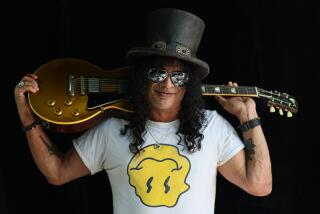Student’s Head Turns From Pot to Space Urchin
- Share via
After dropping out of high school in 11th grade, John Slack did nothing but sit in his room, watch TV and smoke marijuana in his South-Central Los Angeles neighborhood. But Slack, now a biology graduate student at Cal State Northridge, knew he couldn’t tolerate that life style for long.
“I had to do more than what I was doing,” he says. “My plan internally was to self-destruct, until I was willing to pick myself up. I think we all have that mechanism. If we’re doing something wrong, we punish ourselves.”
Within months, Slack stopped punishing himself and started educating himself. He studied science, math and spelling books with a vengeance, trying to make up for lost time.
“I’d sit there and study until I’d get a headache. I did nothing but study. And I’ve been doing it ever since,” says Slack, 30, who lives out of a recreational vehicle he parks near the CSUN campus.
An Example
These days, Slack’s turnaround has become so remarkable that CSUN officials hold him up as an example of what one can accomplish through hard work, determination and education. As a milestone, they point to an $18,000 grant he received last month from the National Aeronautics and Space Administration Minority Graduate Research Program.
For the next year, Slack will study the development of sea urchins, simple sea organisms whose embryonic tissues are so clear that life processes can be easily observed.
Later the urchin embryos will be placed aboard a space shuttle flight, where their development will be compared to the results of Slack’s laboratory studies. Scientists will determine whether the absence of gravity in space hinders the urchins’ growth.
“The urchins’ basic development patterns are similar to humans,” says Steven Oppenheimer, the CSUN biology professor working with Slack. “If we ever plan to have human reproduction or animal breeding in space, we’ll need to know if it works. If space messes up the sea urchin, it’s going to mess up humans.”
Oppenheimer says Slack has displayed incredible dedication to his work. “He’s one of the most conscientious, ambitious, meticulous students I’ve ever seen. He’s as good as they come.”
Slack always thought he was capable of top-notch work, but growing up in rough-and-tumble South-Central Los Angeles didn’t foster his ambition. Sometimes, he says, he would sit and smoke an occasional joint or take a drink. “That was my neighborhood,” he says. “I didn’t go the library and read books in junior high. I went and got a drink.”
So did many of his six brothers and sisters, who Slack says have not yet followed his lead. Some, he says, have been in and out of jail for drug possession. “They’re sort of hooked on what goes on there--hanging around, drinking, doing nothing.”
Inspired by a half brother who came to the city with a college degree, Slack wanted to be different. After teaching himself for several months, he enrolled in an adult high school, got his diploma and then earned Associate of Arts degrees in music and biology from Los Angeles City College.
At one point, he wanted to be a drummer, but he didn’t think he had enough talent to succeed in the music business. “I had to do something more responsible than music,” he says.
So he got a Bachelor of Arts degree in biology from CSUN and enrolled in the masters degree program. He plans to pursue a doctorate and possibly a medical doctor’s degree, and ultimately he would like to work as a scientist for NASA.
Hopes to Inspire
Meanwhile, he hopes to inspire his brothers and sisters. “I try to continue to do the right thing with the hope that they’ll see they have to make those changes,” he says. “I’m not going around preaching to them. It’s their responsibility.”
His mother, Walterine, an evangelist missionary, said she is happy for her son but is at a loss to explain how he managed to outshine her other children.
“I don’t know why he’s so different. They were all raised the same way,” she said. “But I just thank God for it. John is just a very special young man, and we’re hoping the others will follow in his footsteps.”
Slack makes it a habit to visit his family once a week and to call often on the telephone, she said. “He has done great things, but he hasn’t forgotten us during the process. He loves his family.”
Responsibility to Self
Slack says his biggest responsibility right now is to himself and his work. He spends most of his time working in the CSUN lab, sometimes reporting for work at 4 a.m. for no reason other than his interest in the research.
He also lifts weights and runs 3 miles every day, and sometimes he studies at a park in Culver City “where very nice looking girls walk around.” All that’s missing from his life, he says, is a wife--and he’s in no hurry. “The intelligent and responsible thing to do is wait,” he says. “I can’t go out and mess around like other people do. In the morning I know I’m better off. There’s only one right way to do things, so it’s easy.”
For now, he will spend his time studying. “That’s all that’s important to me,” he says. “It’s just what I have to do. I have something inside of me that makes me do what I think is right.”






